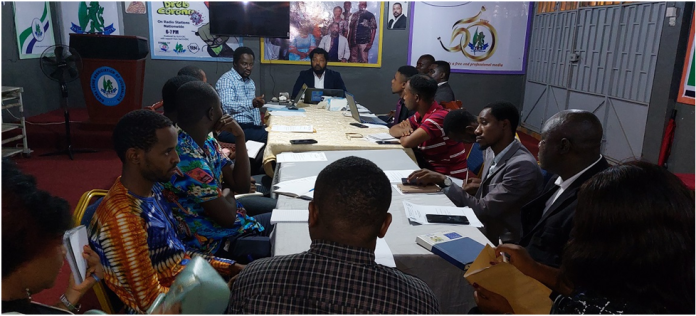By Amin Kef-Ranger
A 2nd Stakeholders Consultation Workshop on the Cyber Security and Crime Act 2021was held by the Sierra Leone Association of Journalists (SLAJ) on Thursday 4th August 2022 to continue the discussion around the law under a project titled, “Cyber Safe Sierra Leone”. The first workshop was held on the 8th of February 2022.
The essence of the engagements, which brought together stakeholders from various sectors, including Civil Society Organizations (CSOs) and MDAs at the Harry Yansaneh Memorial Hall, SLAJ Headquarters, 56 Campbell Street, was to again look at the Cyber security law and identify gaps and sections that could be open to abuse of the right to freedom of expression and to develop strategies for awareness raising targeting constituent members. Thursday’s meeting was to follow up on the recommendations made during the first workshop and develop advocacy strategies around them.
In his opening remarks and update on the project, SLAJ President Ahmed Sahid Nasralla recalled the first stakeholders’ engagement workshop and the training of journalists across the country on cyber law. He read out the many recommendations made at the first workshop and urged stakeholders to come up with ideas and suggestions for implementation.
“There are two aspects to what we are trying to do with this project. First, the law is the law and so we want to promote public awareness about the law so that people understand key provisions to help them avoid coming into conflict with the law. The second is to build advocacy around certain provisions in the law that have the potential to undermine fundamental human rights such as free expression, online freedoms, and data privacy rights,” said Nasralla.
He called on all professionals engaged in the art of expression- from journalists, bloggers, musicians, actors, artists, writers, poets, etc. to be aware of the law and abide by it.
The facilitator of the workshop, Dr. Francis Sowa, gave a brief recap of issues discussed and recommendations made during the first stakeholders consultative meeting and noted that SLAJ was not in any way saying that cyberspace should not be regulated since the same crimes that exist in the physical space also exist in the cyberspace.
“SLAJ and the Media Reform Coordinating Group (MRCG) were actively involved in consultations following the enactment of the Cyber Security and Crime Act 2021. Parliament accepted some of our recommendations and some were not accepted. Now, we want to raise awareness about the law and remind the Government about setting up the necessary structures provided for in the Act. And that we should do through advocacy,” said Dr. Sowa, and cautioned that if you create the law and don’t put the necessary structures in place, it will be left with the Police and the Judiciary to interpret and implement the law as they see fit.
Dr. Sowa cited the Copyrights Act 2011 as an example of a law that has been passed but has no established body to implement it.
He went further to draw the attention of all stakeholders present to key areas in the Cyber Security and Crime Act 2018, which include: Part 1 which focuses on structure and infrastructure, Section 44- which is concerned with cyber bullying and stalking, Section 33-38 unauthorized use of a device and the Data Protection law and 44(3) which concerns Public Interest, even when no law defines what public interest is, not even the Interpretation Act.
Dr. Sowa mentioned the National Cyber Security Advisory Council which has the Vice President and other Government officials on the board noting that SLAJ had recommended for representatives from the media and civil society to be included.
Meanwhile, he cautioned participants to be mindful of the fact that the law still exists and until it is amended it remains the law. “This is why a forum for educating people about the law is necessary so that they do not fall short,” he said.
Sahr Kendema from Campaign for Good Governance called on stakeholders to ensure the advocacy of the law is evidence-based. He recommended mapping out a clear direction of what the advocacy is calling for and why, whilst ensuring it targets certain groups and has specific messages.
“Our key messages must target specific groups; we must ensure we embark on evidence-based advocacy whilst targeting specific groups with specific messages. We must also ensure we simplify the law so everyone understands it,” Kendema said.
The representative from the National Telecommunications Commission (NATCOM), Lamin Lahai, encouraged SLAJ and its partners to bring all parties together to ensure that advocacy is inclusive. On the part of NATCOM, he revealed that the establishment of structures in line with the Cyber law is ongoing.
The Deputy Director General of the Sierra Leone Broadcasting Corporation (SLBC), Alimamy Lahai Kamara, spoke about his institution’s concern about one of the country’s critical national information infrastructures at Leicester Peak. He said that the advocacy must call for that place (Leicester Peak), and other areas where critical information infrastructure are to be protected.
“It is a security risk allowing people to freely hang out at Leister Peak. It can affect all of us if anything happens to that critical national information infrastructure. We must engage the Government, consult with them and urge them to establish the necessary bodies to implement the cyber law,” Kamara said.
The Cyber Safe Sierra Leone Project, which is implemented by SLAJ with support from Internews SL, aims at supporting and defending rights online and free expression in Sierra Leone, while simultaneously bolstering digital literacy and improving the adoption of safe cyber security practices among Internet users in the country.
The next activity under the project, according to the SLAJ President, is engagement with bloggers to help them also understand the law and contribute to advocacy.





Im a blogger and interested in learning the Laws.